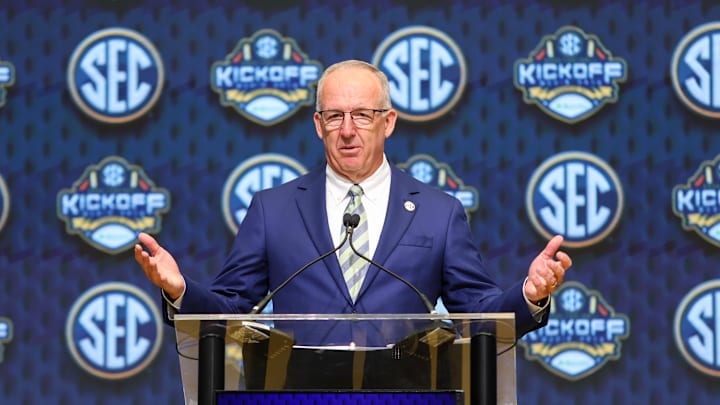The Southeastern Conference has made its stance on the future of the College Football Playoff format very clear. SEC leaders, including Mississippi State president and College Football Playoff board chair Mark Keenum, have expressed that they prefer a system without automatic bids. Their philosophy is simple: the playoff should feature the best teams in the country, regardless of conference affiliation or championship results. With expansion talks heating up, especially around the possibility of moving from a 12-team to a 16-team format, the SEC’s position carries significant weight.
The SEC’s Vision for the Playoff
The SEC’s reasoning comes down to competitive advantage and opportunity. Under an auto-bid model, each conference champion would earn a guaranteed playoff spot, limiting the number of remaining at-large slots. In a structure without automatic qualifiers, the SEC could potentially send several teams based purely on rankings and strength of schedule. This benefits a league as deep and powerful as the SEC, where even mid-tier teams often hold top-15 national rankings.
This season’s rankings illustrate the dynamic perfectly. The SEC currently boasts more teams in the top 16 than any other conference, a reflection of both depth and dominance. If the playoff expands to 16 teams, and if selections are based solely on rankings, the SEC could easily occupy a large portion of the bracket. That possibility underpins the conference’s push for a merit-based system rather than one dictated by automatic bids.
Why Expansion Benefits the SEC
The idea of expanding the College Football Playoff to 16 teams has gained traction because it offers every conference the potential for more representation. On the surface, that seems like a win for everyone with more access, more inclusion, and more meaningful games. But in reality, this format would heavily favor the SEC and Big Ten, whose programs routinely dominate the upper tiers of the rankings.
For the SEC, this isn’t just about fairness; it’s about capitalizing on strength. A 16-team playoff without automatic bids would allow the conference to maximize its exposure and revenue while rewarding its teams for the brutal competition they face weekly. From a business and branding standpoint, it’s an ideal outcome. The conference can proudly argue that it is sending the “best of the best,” regardless of how many come from one league.
The Perception of SEC Bias
Critics argue that this system reinforces existing biases within the playoff committee. The committee has never revealed a strict formula for how it ranks teams, instead describing a subjective evaluation process based on factors like strength of schedule, head-to-head results, and conference championships. That ambiguity opens the door to accusations of bias, particularly favoritism toward the SEC.
If the playoff expands and automatic bids are removed, that perception will only grow stronger. Many fans and media members believe the committee already leans toward SEC teams, and removing automatic qualifiers could amplify that narrative. Still, from the SEC’s perspective, the focus remains on ensuring that the most deserving teams, not simply the most geographically diverse, reach the postseason.
How This Impacts Arkansas’ Head Coaching Search
For programs like Arkansas, the SEC’s stance on the playoff format could have significant ripple effects. As the Razorbacks search for their next head coach, the appeal of the job may actually increase under this evolving playoff landscape. A 16-team playoff without automatic bids opens the door for multiple SEC teams to make the postseason each year. That means a coach at Arkansas wouldn’t need to win the conference outright to have a legitimate path to the playoff, finishing near the top of the league could be more than enough to earn an at-large spot.
From a recruiting and competitive standpoint, this is an enticing prospect. A new head coach could sell recruits and transfers on the chance to play in the nation’s most competitive conference with realistic access to the playoff. The ability to compete on that stage, even without winning the SEC, adds prestige and opportunity to the program. The next Arkansas coach will inherit not just a tough schedule but also a clearer route to national relevance if the CFP expands and maintains a no-auto-bid model.
This could allow the Razorbacks to get some peak interest in their program being at the top of that second-tier of head coaching vacancies outside of Florida, Penn State, and LSU. Arkansas can use this in their pitches for the next head coaching stating they can compete at the highest level and turn things around quickly but this falls back into the program's hands of setting them up for success resource wise.
The Bigger Picture
The SEC’s preference for a playoff without automatic bids is both a strategic and philosophical statement. It reflects confidence in the conference’s strength and a belief that the best teams will rise naturally through the rankings. For Arkansas, it creates a new layer of optimism. The Razorbacks can sell their future coach on a vision of upward mobility in a path where competing hard in the SEC can realistically lead to playoff contention and be applauded for playing the best.
If the playoff does expand to 16 teams without automatic bids, the landscape of college football will tilt even further toward the SEC. That shift would not only redefine postseason access but also reshape how programs like Arkansas recruit, schedule, and build their futures. In a sport where perception often drives opportunity, the SEC’s push for flexibility might just give the Razorbacks the leverage they need to attract a top-tier leader and climb back into national prominence.
